Factorising quadratics – (difficult) (a number in front of `x^2`)
General formula for a quadratic
`ax^2+bx+c=0`
We can solve based on the fact that this is the same as
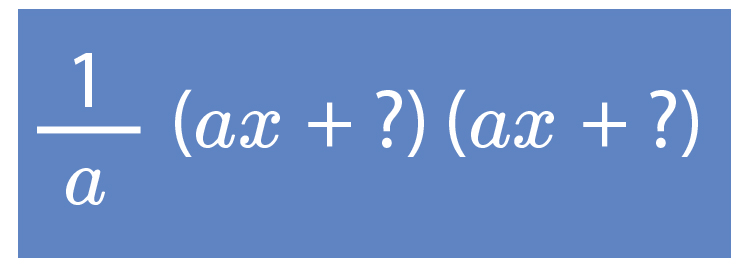
We must ask
What two factors of
`axxc`
add to give `b?`
Example 1
Factorise the following quadratic `4x^2-5x-6=0`
Find
What two factors of `atimesc` add up to `b`
and in this case because `atimesc=4times-6=-24`
We must ask ourselves what factors of `-24` add to give `5` :
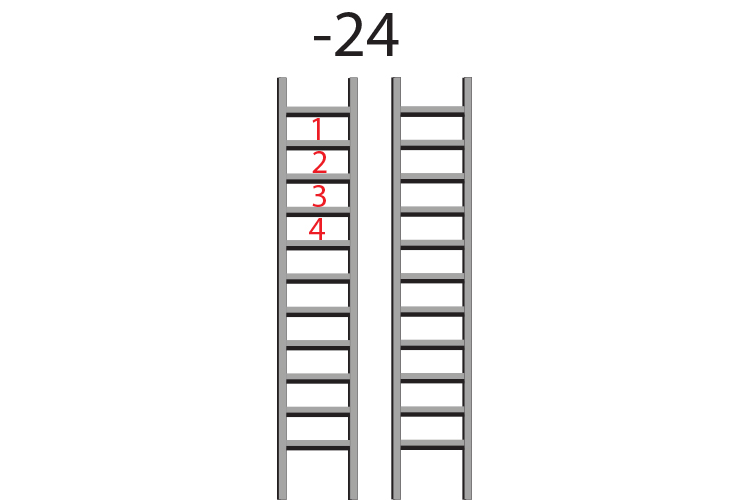
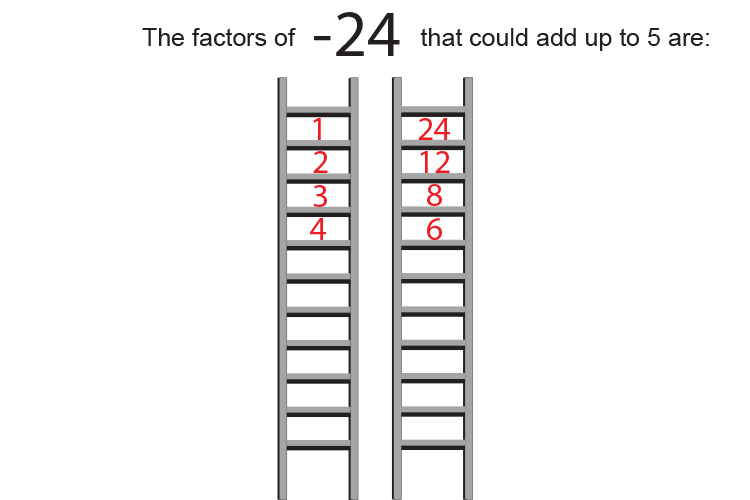
The factors of `-24` are:
| `1` | `times` | `-24` | |
| `or` | `-1` | `times` | `24` |
| `2` | `times` | `-12` | |
| `or` | `-2` | `times` | `12` |
| `3` | `times` | `-8` | |
| `or` | `-3` | `times` | `8` |
| `4` | `times` | `-6` | |
| `or` | `-4` | `times` | `6` |
But the only two factors that add to give `-5` are `-8` and `3`
Put this in the form
`1/a(ax+?)(ax+?)`
`1/4(4x-8)(4x+3)`
Pull out any multiples of 4 from the 1st set of brackets
`1/4times4(1x-2)(4x+3)`
`1/(cancel4)timescancel4(1x-2)(4x+3)`
`(1x-2)(4x+3)`
This can now be solved as
`1x-2=0`
and `4x+3=0`
Which is the same as
`x=2` or `x=(-3)/4`
Now check
If `x=2` `4times2^2-5times2-6=0`
`16-10-6=0` Which is correct
If `x=(-3)/4` `4times((-3)/4)^2-5times(-3)/4-6=0`
`4times((-3)/4times(-3)/4)+15/4-6=0`
`4times9/16+15/4-6=0`
`36/16+15/4-6=0`
`2\4/16+3\3/4-6=0` Which is correct
Answer:
The roots of `4x^2-5x-6=0` are `x=2` and `x=(-3)/4`
Example 2
Factorise the following quadratic `6x^2+7x-3=0`
Find
What two factors of `atimesc` add up to give `b`
and in this case because `atimesc=6times-3=-18`
We must ask ourselves what factors of `-18` add to give `7` :
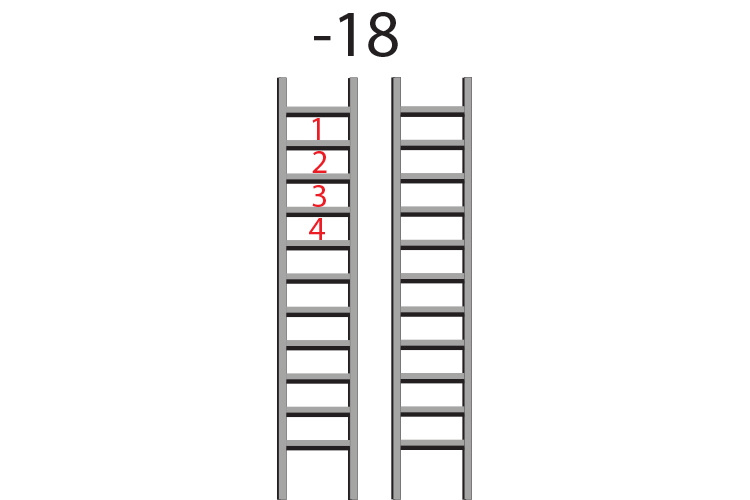
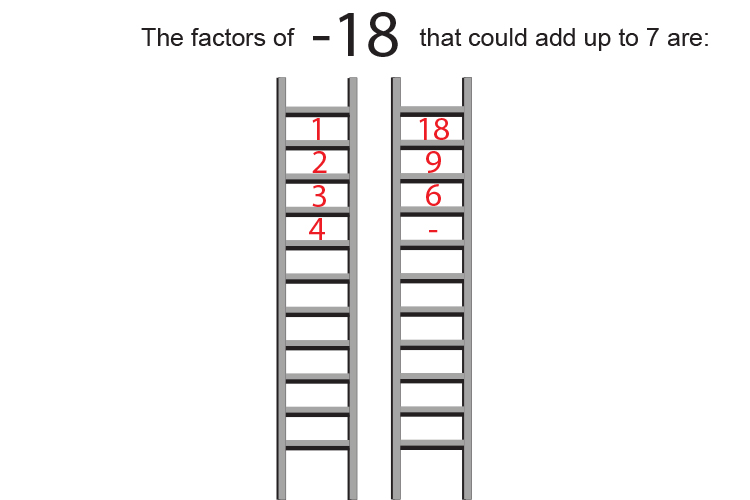
The factors of `-18` are:
| `1` | `times` | `-18` | |
| `or` | `-1` | `times` | `18` |
| `2` | `times` | `-9` | |
| `or` | `-2` | `times` | `9` |
| `3` | `times` | `-6` | |
| `or` | `-3` | `times` | `6` |
But the only two factors that add to give `7` are `9` and `-2`
Put this in the form
`1/a(ax+?)(ax+?)`
`1/6(6x+9)(6x-2)`
Pull out any multiples of 6 from the 1st set of brackets
`1/6times6(1x+1.5)(6x-2)`
`1/cancel6timescancel6(1x+1.5)(6x-2)`
`(1x+3/2)(6x-2)`
This can now be solved as
`1x+3/2=0`
and `6x-2=0`
Which is
`x=-3/2`
and `x=2/6` or `1/3`
Now check
If `x=-3/2` `6times ((-3)/2)^2 +7times(-3)/2-3=0`
`6times((-3)/2times(-3)/2)-21/2-3=0`
`6times(9/4)-21/2-3=0`
`(6times9)/4-21/2-3=0`
`(3times9)/2-21/2-3=0`
`27/2-21/2-3=0`
`13\1/2-10\1/2-3=0` Which is correct
If `x=1/3` `6times (1/3)^2 +7times1/3-3=0`
`6times(1/3times1/3)+7/3-3=0`
`6/9+7/3-3=0`
`2/3+2\1/3-3=0` Which is correct
Answer:
The roots of `6x^2+7x-3=0` are `x=-3/2` and `x=1/3`
Example 3
Factorise the following quadratic `3x^2+14x-5=0`
Find
What two factors of `atimesc` add up to `b`
and in this case because `atimesc=3times-5=-15`
We must ask ourselves what factors of `-15` add to give `14` :
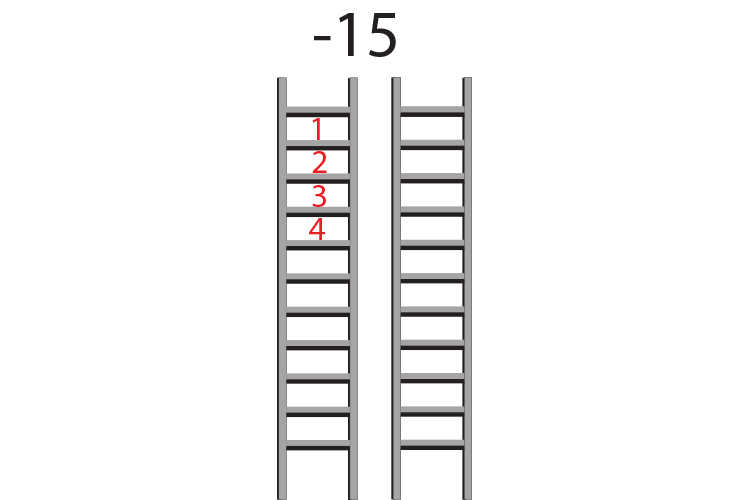
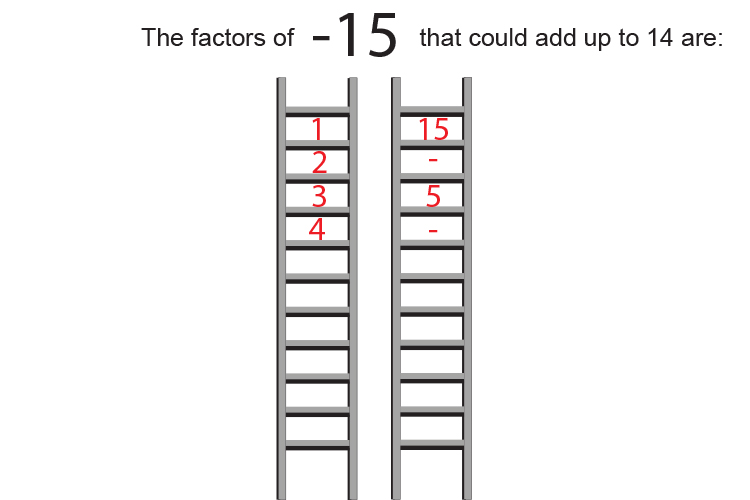
The factors of `-15` are:
| `1` | `times` | `-15` | |
| `or` | `-1` | `times` | `15` |
| `3` | `times` | `-5` | |
| `or` | `-3` | `times` | `5` |
But the only two factors that add to give `14` are `15` and `-1`
Put this in the formula:
`1/a(ax+?)(ax+?)`
`1/3(3x+15)(3x-1)`
Pull out any multiples of 3 from the 1st set of brackets
`1/3times3(1x+5)(3x-1)`
`1/cancel3timescancel3(1x+5)(3x-1)`
This can now be solved as
`1x+5=0`
and `3x-1=0`
Which is
`x=-5`
and `x=1/3`
Now check
If `x=-5` `3times (-5)^2 +14times(-5)-5=0`
`75-70-5=0` Which is correct
And if `x=1/3` `3times (1/3)^2 +14times(1/3)-5=0`
`3times (1/9) +14/3-5=0`
`3/9+14/3-5=0`
`1/3+4\2/3-5=0` Which is correct
Answer:
The roots of `3x^2+14x-5=0` are `x=-5` and `x=1/3`




